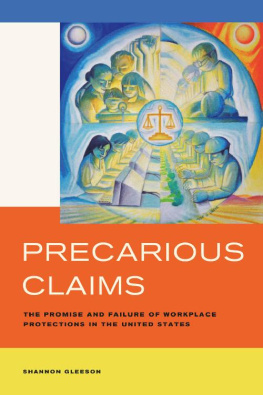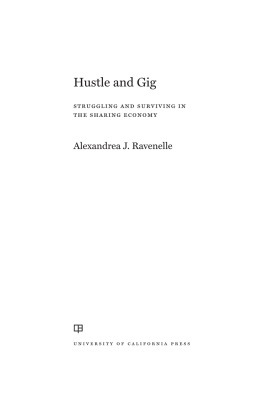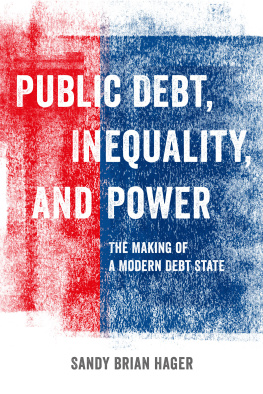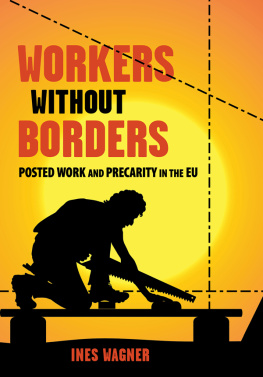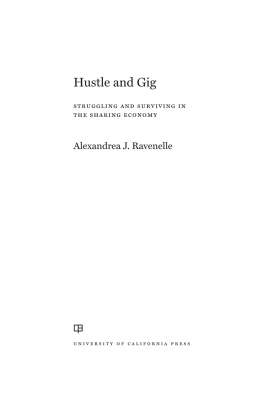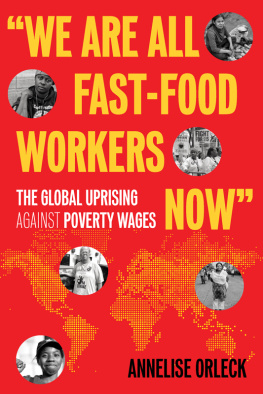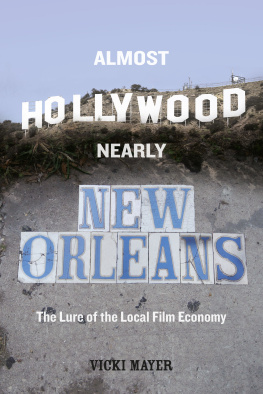Luminos is the open access monograph publishing program from UC Press. Luminos provides a framework for preserving and reinvigorating monograph publishing for the future and increases the reach and visibility of important scholarly work. Titles published in the UC Press Luminos model are published with the same high standards for selection, peer review, production, and marketing as those in our traditional program. www.luminosoa.org
Precarious Claims
Precarious Claims
The Promise and Failure of Workplace Protections in the United States

Shannon Gleeson

UNIVERSITY OF CALIFORNIA PRESS
University of California Press, one of the most distinguished university presses in the United States, enriches lives around the world by advancing scholarship in the humanities, social sciences, and natural sciences. Its activities are supported by the UC Press Foundation and by philanthropic contributions from individuals and institutions. For more information, visit www.ucpress.edu .
University of California Press
Oakland, California
2016 by Shannon Gleeson
This work is licensed under a Creative Commons CC-BY-NC-ND license. To view a copy of the license, visit http://creativecommons.org/licenses .
Suggested citation: Gleeson, Shannon. Precarious Claims: The Promise and Failure of Workplace Protections in the United States . Oakland, University of California Press, 2016. doi: http://doi.org/10.1525/luminos.19
Library of Congress Cataloging-in-Publication Data
Names: Gleeson, Shannon, 1980- author.
Title: Precarious claims : the promise and failure of workplace protections in the United States / Shannon Gleeson.
Description: Oakland, California : University of California Press, [2017] |Includes bibliographical references and index. | Description based on print version record and CIP data provided by publisher; resource not viewed.
Identifiers: LCCN 2016021065 (print) | LCCN 2016019951 (ebook) | isbn 9780520963603 (ebook) | isbn 9780520288782 (pbk. : alk. paper)
Subjects: LCSH: Working classCalifornia, NorthernCase studies. | Work environmentCalifornia, NorthernCase studies. | Work environmentLaw and legislationUnited States. | Labor laws and legislationUnited States. | Industrial safetyUnited States.
Classification: LCC HD8066 (print) | LCC HD8066 .G54 2017 (ebook) | DDC 344.7301dc23
LC record available at https://lccn.loc.gov/2016021065
Manufactured in the United States of America
25 24 23 22 21 20 19 18 17 16
10 9 8 7 6 5 4 3 2 1
CONTENTS
ACKNOWLEDGMENTS
This book is the culmination of so many support networks, intellectual and beyond.
The project began when I first arrived as a faculty member in the Department of Latin American and Latino Studies at the University of California, Santa Cruz. My colleagues in LALS and Sociology, and the UCSC Center for Labor Studies and Chicano Latino Research Center, provided the initial intellectual support for this project, and the best place I ever could have started my career. Financial support for the study was provided generously by the UCSC Committee on Research, the UCSC Chicano Latino Research Center, the UCSC Hellman Fellows Program, the UC Center for New Racial Studies, the UC Institute for Mexico and the United States, the UC Global Health Initiative Center of Expertise on Migration and Health, the Ford Foundation, and the American Sociological Association Fund for the Advancement of the Discipline.
This research was made possible by a team of research assistants, including Annie Lin, Brian Jimenez, Jimmy Chiu, Hannah Fishman, Anel Flores, Joe Garcia, Claudia Medina, Iris Casanova, Mariela Rodriguez, and Claudia Lopez. Several fierce legal advocates referred me to their clients and provided feedback along the way, including Marisol Escalera Durani, Mike Gaitley, Jenna Grambourt, Henry Martin, Adriana Melgoza, Patty Salazar, Marci Seville, Ruth Silver-Taube, Daniela Urban, Florencia Valle-Miller, and Nick Webber. I thank also the California Division of Workers Compensation, including Etna Borrero and Esther Pangelina.
My research and analysis benefited tremendously from feedback at several convenings, including those held by the American Sociological Association, the Latin American Studies Association, the Law and Society Association, the Population Association of America, the Labor and Employment Relations Association, and the Pacific Sociological Association. I thank also the University of Pennsylvania, the USC School of Social Work Immigrant Health Initiative, the Global Labour Research Centre at York University, and the UCSC Departments of Psychology and Sociology for inviting me to present on early findings from this research and for providing excellent feedback. Since arriving at Cornell, I have also learned a great deal from discussions with my colleagues at the Cornell Worker Institute Precarious Workforce Initiative and the Cornell Center for the Study of Inequality. I thank all the scholars who organized these panels, provided remarks, presented alongside me, and asked probing questions.
My analysis developed further following discussions at a range of workshops, including those hosted by the Tepoztln Institute for the Transnational History of the Americas, the UCLA Labor Center, the UCLA Csar E. Chvez Department of Chicana/o Studies, the UCLA International Institute Program on International Migration, the San Jose State University Immigration Symposium, the Pennsylvania State University Center for Global Workers Rights, the UC Center for New Racial Studies, the UC Irvine School of Law, the UCSD Center for Comparative Immigration Studies, the Stanford Center on Poverty and Inequality, the Rice University Baker Institutes Latin America Initiative Immigration Research Project, the COEMH Summer Institute on Migration and Global Health, the UC Humanities Research Initiative, and the Critical Race Theory and Empirical Methods Working Group.
Writing is hard. Rewriting is harder. Ive benefited extensively from the support of other writers who have read through draft after draft and pushed me to rethink and refine. Several scholars, mostly women, have taken the time to read and comment on my work, and help me through the often lonely and distracting process of writing. Amada Armenta, Els de Graauw, and Cristina Mora have been my constant cheerleaders. Marcel Paret pushed me to think hard about the factors shaping precarity, Kate Griffith provided the sharp eye of a legal scholar, and Anthony Ocampo helped me storyboard and hopefully do justice to these workers lives. Cristina Mora, Cybelle Fox, and Laura Lpez-Sanders provided some of the most critical early support. The ILR Womens Writing Group and the UC Berkeley Framing Immigrant Rights Writing Group provided interdisciplinary critique and encouragement as the project came to fruition. Colleagues from the National Center for Faculty Development and Diversity, including Miriam Boesch and Sue Maguire, as well as Sonja Poole and Elise Murowchick, checked in with me regularly and helped keep me accountable.
Throughout the project, several colleagues offered additional insight, including Leisy Abrego, KT Albiston, Xchitl Bada, Carolina Bank-Muoz, Annette Bernhardt, Ellen Berrey, Irene Bloemraad, Kristin Bumiller, Sbastien Chauvin, Jennifer Chun, Alex Colvin, Ileen Devault, Allison Elias, Anna Haskins, Tanya Golash-Boza, Ruth Gomberg-Muoz, Erin Hatton, Ming Hsu Chen, Lisa Martinez, Steve McKay, Ruth Milkman, Cristina Morales, Genevieve Negrn-Gonzales, Caitlin Patler, Veronica Terriquez, Kim Voss, and Pat Zavella.
I thank my family for their love, and the incessant wondering hows the book going? including Mom, Dad, Danny, Tom, Carol, Papa, Estela, Sav, Aunt Steph, Uncle Michael, Ry, Er, Jack, Ez, and the many other cousins and tas. Several friends have played the hardest role of encouraging me through the minutiae of daily writing (or attempting to write), and reminding me of the important things in life. My dear friends Rhonda Campbell, Shelly Grabe, Sylvanna Falcn, Milton Magaa, Chris Sullivan, and Leslie Wang supported me through my transition to Ithaca, long before, and long since. Ramon Rodriguez and Javier Bidho, also talented artists, provided friendship and inspiration. BYCI gave me community in Ithaca. Since arriving in my new home, Veronica Martinez-Matsuda, Mike Matsuda, Lucia Matsuda, Joaqun Matsuda, and Oscar Matsuda welcomed me with open arms and have provided me with friendship, much-needed grounding, and social eating. Finally, Gabriel Carraher, Hyacinth, Chahta, Paco, and even Wax also kept me fed and loved.
Next page
